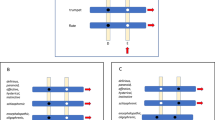Abstract
Emil Kraepelin’s contribution to the clinical and scientific field of psychiatry is recognized world-wide. In recent years, however, there have been a number of critical remarks on his acceptance of degeneration theory in particular and on his political opinion in general, which was said to have carried “overtones of proto-fascism” by Michael Shepherd [28]. The present paper discusses the theoretical cornerstones of Kraepelinian psychiatry with regard to their relevance for Kraepelin’s attitude towards degeneration theory. This theory had gained wide influence not only in scientific, but also in philosophical and political circles in the last decades of the nineteenth century. There is no doubt that Kraepelin, on the one hand, accepted and implemented degeneration theory into the debate on etiology and pathogenesis of mental disorders. On the other hand, it is not appropriate to draw a simple and direct line from early versions of degeneration theory to the crimes of psychiatrists and politicians during the rule of national socialism. What we need, is a differentiated view, since this will be the only scientific one. Much research needs to be done here in the future, and such research will surely have a significant impact not only on the historical field, but also on the continuous debate about psychiatry, neuroscience and neurophilosophy.


Similar content being viewed by others
Notes
This would, for example, be one of the highly interesting scientific topics that we need to deal with in the near future, as mentioned at the end of this paper.
The influence of the founder of experimental psychology, Wilhelm Wundt (1832–1920), on Kraepelin can hardly be overestimated. Wundt’s aim was to establish psychology as a kind of natural science. He declined the speculative approach of the romantic “philosophy of nature” (e.g. Schelling), but did not agree with materialism or association psychology (e.g. Herbart) either. At least in his earlier writings, Wundt favoured a parallelistic point of view in the mind-body-problem: Experimental research may successfully be used in psychology as in natural sciences, without thereby ignoring the epistemological differences between the mental and the physical [30].
References
Birnbaum K (1919) Der Aufbau der Psychose. Ein klinischer Versuch. Allgemeine Z Psychiatrie Psychisch-gerichtliche Med 75:455–502
Brüne M (2001) Evolutionary fallacies of Nazi psychiatry: implications for current research. Perspect Biol Med 44:426–433
Chamberlin E, Gilman S (eds) (1985) Degeneration. The dark side of progress. Columbia University Press, New York
Dowbiggin I (1985) Degeneration and hereditarianism in French mental medicine 1840–1890—psychiatric theory as ideological adaptation. In: Bynum WF, Porter R, Shepherd M (eds) Anatomy of madness, vol I: People and Ideas. Tavistock, London, pp 188–232
Engstrom EJ (1991) Emil Kraepelin: psychiatry and public affairs in Wilhelmine Germany. Hist Psychiatry 2:111–132
Engstrom EJ (1995) Kraepelin—social section. In: Berrios GE, Porter R (eds) A history of clinical psychiatry. The origin and history of psychiatric disorders. Athlone, London, pp 292–301
Gaupp R (1920) Der Fall Wagner. Eine Katamnese, zugleich ein Beitrag zur Lehre von der Paranoia. Z Gesamte Neurol Psychiatrie 60:312–327
Griesinger W (1845) Die Pathologie und Therapie der psychischen Krankheiten. A. Krabbe, Stuttgart (2nd edn, 1861)
Hermle L (1986) Die Degenerationslehre in der Psychiatrie. Fortschr Neurol Psychiatrie 54:69–79
Hoff P (1994) Emil Kraepelin und die Psychiatrie als klinische Wissenschaft. Ein Beitrag zum Selbstverständnis psychiatrischer Forschung. Springer, Berlin
Hoff P (1995) Kraepelin—clinical section. In: Berrios GE, Porter R (eds) A history of clinical psychiatry. The origin and history of psychiatric disorders. Athlone, London, pp 261–279
Hoff P (1998) Emil Kraepelin and forensic psychiatry. Int J Law Psychiatry 21:343–353
Hoff P, Hippius H (2001) Wilhelm Griesinger (1817–1868) — sein Psychiatrieverständnis aus historischer und aktueller Perspektive. Nervenarzt 72:885–892
Kahlbaum K (1863) Die Gruppierung der psychischen Krankheiten und die Eintheilung der Seelenstörungen. Entwurf einer historisch-kritischen Darstellung der bisherigen Eintheilungen und Versuch zur Anbahnung einer empirisch-wissenschaftlichen Grundlage der Psychiatrie als klinischer Disciplin. Kafemann, Danzig
Kahlbaum K (1874) Die Katatonie oder das Spannungsirresein. Eine klinische Form psychischer Krankheit. Hirschwald, Berlin
Kraepelin E (1918) Ziele und Wege der psychiatrischen Forschung. Z Gesamte Neurol Psychiatrie 42:169–205
Kraepelin E (1919) Die Erforschung psychischer Krankheitsformen. Z Gesamte Neurol Psychiatrie 51:224–246
Kraepelin E (1920) Die Erscheinungsformen des Irreseins. Z Gesamte Neurol Psychiatrie 62:1–29
Liegeois A (1991) Hidden philosophy and theology in Morel’s theory of degeneration and nosology. Hist Psychiatry 2:419–427
Magnan V (1891/1893) Psychiatrische Vorlesungen. Thieme, Leipzig
Magnan V (1896) Les dégenerés. Masson, Paris
Marx OM (1990) German romantic psychiatry, Part I. Hist Psychiatry 1:351–381
Max OM (1991) German Romantic Psychiatry, Part II. Hist Psychiatry 2:1–25
Morel BA (1857) Traite des degenerescences. Bailliere, Paris
Morel BA (1864) De la formation du type dans les varietes degeneres. Bailliere/Masson, Paris
Pick D (1989) Faces of degeneration: a European Disorder 1848–1918. Cambridge University Press, Cambridge
Shepherd M (1995a) Two faces of Emil Kraepelin. Br J Psychiatry 167:174–183
Shepherd M (1995b) Kraepelin and modern psychiatry. Eur Arch Psychiatry Clin Neurosci 245:289–295
Verwey G (1985) Psychiatry in an anthropological and biomedical context—Philosophical presuppositions and implications of German psychiatry 1820–1870. D. Reidel, Dordrecht
Wundt W (1894) Über psychische Causalität und das Princip des psychophysischen Parallelismus. Philoso Stud 10:1–124
Zubin J, Oppenheimer G, Neugebauer G (1985) Degeneration theory and the stigma of schizophrenia (Editorial). Biol Psychiatry 20:1145–1148
Disclosure
The author has no conflict of interest to declare.
Author information
Authors and Affiliations
Corresponding author
Rights and permissions
About this article
Cite this article
Hoff, P. Kraepelin and degeneration theory. Eur Arch Psychiatry Clin Neurosc 258 (Suppl 2), 12–17 (2008). https://doi.org/10.1007/s00406-008-2002-5
Published:
Issue Date:
DOI: https://doi.org/10.1007/s00406-008-2002-5




